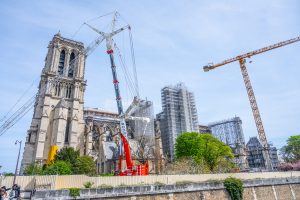
In civil engineering, the preservation of historic structures presents a unique set of challenges that require a balance of technical expertise and artistic sensibility. Engineers involved with historic preservation projects often find themselves in a realm where structural systems and outdated materials must meet the demands of modern restoration. However, educational opportunities that equip engineers with this type of knowledge are limited, leaving many engineers without essential classroom preparation.
Thanks to the collaboration of two dedicated and experienced engineers, Edmund Meade and Justin Spivey, the CaSE department has developed comprehensive courses in historic preservation, ensuring our civil engineers will be able to successfully navigate this discipline that blends both history and engineering. Edmund Meade, CaSE alumnus and advisory committee member, currently serves as principal and the director of preservation at New York City-based Silman, while Justin Spivey is a senior associate at Wiss, Janney, Elstner Associates Inc., in Philadelphia.
These unique courses developed by Meade and Spivey were recently highlighted in Civil Engineering Magazine, the official publication of the American Society of Civil Engineers (ASCE), where Johns Hopkins University (JHU) was noted as one of the few institutions in the United States offering such training. Taught by Meade and Spivey, these courses cover a spectrum of topics—from historic structural materials to strategies for preventing damage during adjacent construction activities—and leverage Meade and Spivey’s industry experience to bring real world examples to students. CaSE’s historic preservation courses are available to undergraduate, masters, and doctoral students, providing a unique educational opportunity for students to gain insight into the intricacies of historic preservation.
Learn more about the development of these classes at JHU’s CaSE and the importance of having engineers skilled in historic preservation by reading ASCE’s full article here.